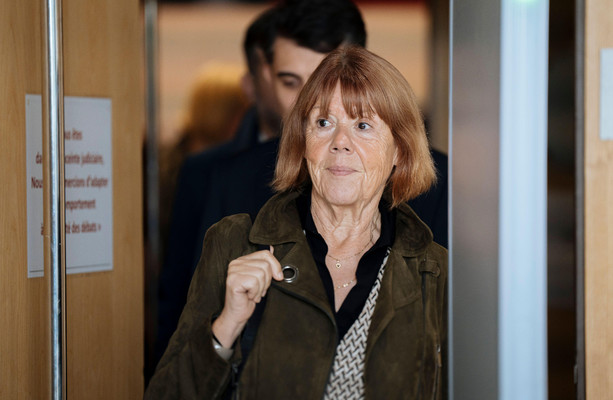Gisèle Pelicot Shares Her Truth in France’s Mass Rape Trial
Gisèle Pelicot, the woman at the center of a high-profile mass rape trial in France, took the stand recently, delivering a heart-wrenching testimony that has resonated throughout the nation. As she described her anguish and feeling of betrayal at the hands of her former husband, Pelicot reinforced that the societal shame should not rest with the survivors, but with those responsible for the crimes. This case, which involves a group of men accused of horrific sexual assaults, raises critical questions about justice, accountability, and the treatment of victims in society.
A Journey Filled with Pain
Gisèle Pelicot’s ordeal began years ago when she was subjected to brutal sexual assaults involving a group of men, including a soldier, a nurse, and a lorry driver, among others. The trial, which has garnered widespread media attention, is not only a personal battle for Pelicot but also speaks to the struggles of countless survivors of sexual violence. During her testimony, she disclosed chilling details of her experiences, stating, "This is not just my battle; it’s for every woman who has suffered in silence."
Her remarks echo the sentiments of many in France’s #MeToo movement, pushing for greater awareness and reforms in how sexual violence cases are handled by the judicial system. "It’s not for us to have shame – it’s for them," Pelicot emphasized, a statement that embodies the shift towards empowering survivors to reclaim their narratives.
The Legal Proceedings: A Close Look at the Accused
The trial has revealed the identities of a range of defendants, contributing to a portrait of a deeply ingrained culture of impunity that survivors often encounter. Reports indicate that upwards of 20 men are implicated in Pelicot’s case, with roles spanning various professions and backgrounds. Each accused stands trial not just for their alleged crimes but as representatives of systemic failures in safeguarding victims.
Key Highlights from the Trial
- Trial Duration: Ongoing with multiple hearings scheduled.
- Location: Courtroom in Lyon, France.
- Accused Profile: Men from diverse professions including a soldier, a healthcare worker, and a driver.
- Gisèle’s Statements: A powerful rejection of shame directed towards the survivors.
An Emotional Stand Against Betrayal
In her emotional address, Pelicot confronted her ex-husband, who she claims "destroyed" her life. "You turned my world upside down. It is you who should answer for your actions," she asserted, drawing tears from the courtroom audience, and underscoring the personal toll of betrayal.
Gisèle’s distressing narrative sheds light on the complex dynamics of personal relationships intertwined with trauma. During her testimony, she articulated the struggle of reconciling her feelings of loyalty towards her husband with the reality of his actions, painting a vivid picture of her ongoing battle with emotional scars.
Broader Implications: Addressing Sexual Violence in Society
The ramifications of Pelicot’s story extend well beyond the courtroom. This trial represents an opportunity to catalyze significant changes in societal attitudes towards sexual violence and to galvanize conversations about victim support.
Experts argue that the visibility of such cases can provoke a necessary examination of how victims are treated both socially and within the legal framework. Dr. Marie Dupont, a leading voice in France’s psychological community, stated, "Cases like Gisèle’s illuminate the urgency for cultural change. We need to prioritize the voices of survivors to break the cycle of silence."
Community Response and Ongoing Advocacy
Public interest in the case has surged, resulting in numerous advocacy groups rallying around Pelicot’s cause. Gatherings have been held across France, calling for justice, empowerment for survivors, and institutional accountability. Activists believe that this trial could be pivotal in shaping new policies that recognize the severity of sexual violence and instigate real change.
Resources for Survivors
- Crisis Support: National counseling services for survivors.
- Advocacy Groups: Organizations devoted to legal advocacy and legislative reform.
- Educational Programs: Initiatives aimed at awareness and prevention in communities.
What Lies Ahead
As the trial continues, there remains a palpable sense of hope among advocates that Gisèle Pelicot’s courage in speaking out may inspire similar testimonies and lead to robust reforms in addressing sexual violence. The outcome could redefine societal approaches to accountability and support for survivors.
Gisèle’s journey has lit a beacon of defiance against a backdrop of adversity, transforming her battle into a collective stand for change. As this trial unfolds, it is clear that the findings may not just impact those involved but could also resonate through future generations.
We encourage readers to engage in this dialogue—how can society evolve to better support survivors of sexual violence? Share your thoughts in the comments below.
For ongoing updates on this trial and related issues, check out our other articles on the realities of sexual violence and advocacy efforts in France. [Presence of helpful internal links here].
For additional information on trauma support and legal rights for victims, please visit authoritative sources like Rape Crisis England & Wales and Amnesty International’s reports on sexual violence.

